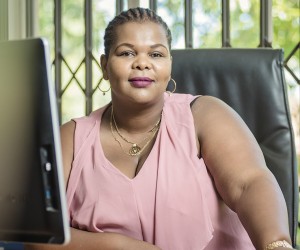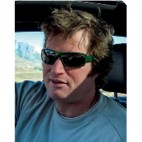Since her appointment as Director, she has not looked back and is now the sole Director of Dyrex after her partner left the company. Driven to succeed is one way of explaining Ketiso but it is her willingness and work to help others achieve that grabs the attention.
She explains that when she first arrived almost six years ago, after Dyrex got a contract with Exxaro in 2016, she felt the need to take on the HR responsibilities. “I believed that we needed to have this relationship with our own people so that we could build relationships with them and then in terms of the law and the Act, we could have an outsider implement that,” Ketiso explains.
Now that her partner has left the company, Ketiso has more responsibility but she still largely deals with most issues, including HR, herself.
However, it didn’t simply fall into Ketiso’s lap, she had to learn her trade. She understood the mining industry but management was new to her, as she explains, “I had to learn new things, such as the law and how to handle it. I handle the disciplinary matters and union negotiations, from wage to settlement negotiations. I’m also the one who attends the CCMA case and who mainly communicates with the clients, I attend all the meetings and should any changes be required, I am the one who implements them. Essentially, my day is quite full from start to finish, and sometimes it finishes rather late.”
Services
Dyrex offers their clients numerous mining services across the board, above and underground. According to Ketiso, they offer “whatever the mine needs” as they specialise in all mining activities.
- Coal mining (both underground and surface)
- Ventilation wells
- Belt sweeping
- Belt operation
- The building of underground structures
- The cleaning of the plant
- Stone dust barriers
- Bulk maintenance
- Women in mining
- General work (underground and surface)
- Labour services (skilled, artisans, miners and unskilled labour services)
- Underground reclaiming
- Concrete work (underground and surface)
One of the great global sticking points has been to ensure the rise of women within the private and public sectors. In general, South Africa has done reasonably well, especially within the public sector, but mining/construction has always been a male-dominated industry. Ketiso has managed to attain success while fighting against the odds.
“One of the things I’ve learnt in life is that if you want to change your environment or your world, you yourself don’t have to be a stereotype, you yourself don’t have to think like the stereotype. It’s so amazing when you come into a world where everything is green and you come yellow.
“People might take some time to get used to your yellowness, to absorb it, but eventually, if you stick to what you’re supposed to be the doing and stay focused, people will respect you.
“Mining is a tough industry, that I can promise you. Not because of male-domination but because it is a very complex industry. We do a lot of work and everything needs to be done in a specific way, according to regulations, so whoever thinks it is easy and anyone can do it, should think again.
“It was not easy in the beginning but also, I didn’t get negative vibes or energy from the people I was in contact with, everybody was very supportive, everybody was willing to assist, everybody opened the door and wanted me to make this work, which helped me a lot,” she says.
It is evident that Ketiso has all the knowledge and skills to be very successful at her job but what really sets her apart from many others is her mindset.
She explains, “My mindset was different, I never came into this position to prove anyone wrong or to prove a point. I’m there to achieve the vision that I have for my life and the company.”
She is also completely behind the empowerment of women. In fact, she says, in her opinion, the government could do with more women who are given bigger roles and more responsibility.
“I think, as women, we can make a massive difference in this country, we can help give it a brighter outlook—sometimes we could do with letting the egos slide,” claims Ketiso.
In general, employing women has a far bigger economic impact as they are often single mothers looking after numerous mouths so one employed person often affects up to six different people on an economic level.
But while she believes giving women jobs is good, Ketiso says that it is not enough to just do that.
“You must develop them, develop their skills, develop their intellect and empower them further in life—that is just the beginning. We want to go further. I believe that South Africa can be a better place if more women are advanced, not only black women but women of all races. We can all contribute to our country and society,” she says.
On the political front, things are looking up, according to Ketiso. Corruption has held this country in a stranglehold for years but in more recent times, it has come to the fore and it is being dealt with by President Ramaphosa.
“When the new president came in and said he was going to clean out corruption, that made us as business people happy, it gave us confidence.
“Although at the time, it was just a promise, he has acted since and what we see going on now gives us more hope. If it continues in this way, we are looking at a brighter future, our business confidence will continue to grow,” she explains.
Leadership
In terms of leadership, Ketiso believes in giving people the power, giving her workforce the power to do things their way, despite her love of being involved in everything. “I like to give people freedom. I’ve discovered that people are very unique and have very unique ways of doing the same thing, and they all achieve the same goal but they just have a unique way of achieving it. Thus, I taught myself to let people be, to give them space and the choice in order to allow that uniqueness in them to manifest and to let them lead as well.
“There are times when, as a leader, you are required to step in. Sometimes a person faces a challenge and then I will step in and say, ‘let’s sit down and see what we can do’, and then I lead from that front, but I always allow the individual to make a decision that they are comfortable with.
“I have over 100 employees with six teams, each with its own supervisor as well as site managers and so forth.
“I find it far more effective to ask how they are going to lead their team and then we can sit down and discuss how they are going to save time, control safety, avoid incidents and save money—I find that easier than telling them how they should do it and it also empowers them,” she says.
According to Ketiso, people are the most valuable investment. After all, the employees are the ones who produce the work that gets the turnover to where it needs to be.
“Sacrifices must be made in business. You must be patient with your employees and you must encourage them. These are the three fundamentals of my business. Sometimes, it is worth taking a touch less profit if it means your employees are happy,” Ketiso says.
It is safe to say that Dyrex is in safe hands as they continue their growth over the next few years. Possible expansion into southern Africa is on the horizon for Ketiso and Dyrex—if there were any doubts about her ability as a Director five years ago, those have surely dissipated. Ketiso is grateful to both Anglo American and Exxaro for their empowerment and faith in her and the company.
In closing, she says, “I have learnt that it’s not about money—business is not about money. Money is the prize at the end for accomplishing your goals and the vision you had, money is the reward for that.
“In order to build a successful business, one must build oneself up too. If I fall apart, so will my business, so I invest in myself and in positive things, and I surround myself with good energy.”






